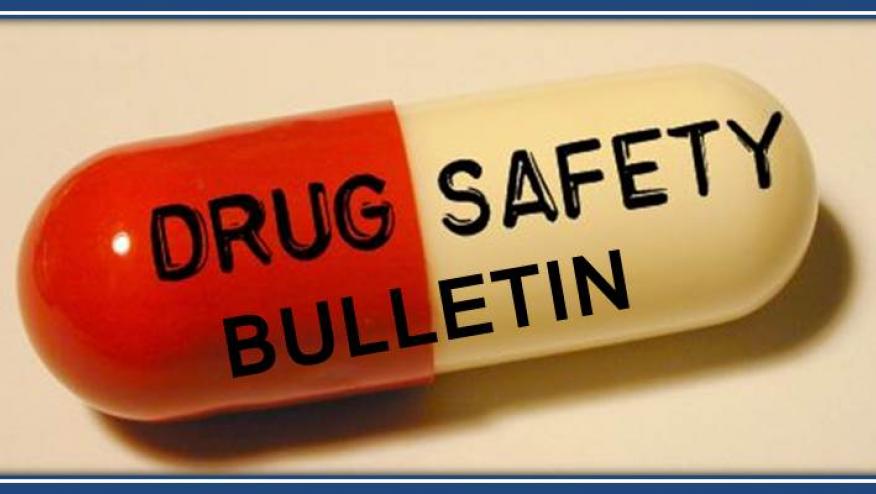Drug Safety Update for November 2015 Save

The Down-Side of Electronic Medical Records. EMRs (or EHRs) have become increasingly utilized in daily practice. The benefits of these include better record-keeping, safe prescribing, patient and drug tracking, adverse event monitoring and checks for drug interaction. Unfortunately, these safety (and efficacy) benefits may go unnoticed by the patient. A report from JAMA studied patients followed in “safety net” clinics (serving special needs populations) and noted that when EMR use was associated with lower patient satisfaction and observable communication differences. Unfortunately, this consequence is being seen in patients who already have limited communication possibilities. (Citation source: http://buff.ly/1OLflPu)
Diabetes, SGLT2 Inhibitors and New Warnings. After a safety review, the FDA has issued new warnings to the labels of a specific class of type 2 diabetes medicines called sodium-glucose cotransporter-2 (SGLT2) inhibitors about the risks of ketoacidosis and serious urinary tract infections, especially in those with suggestive symptoms. Ketoacidosis can occur even if the blood sugar level is not very high. If ketoacidosis is suspected, the SGLT2 inhibitor should be discontinued and treatment instituted promptly. SGLT2 inhibitors are a class of prescription medicines that are FDA-approved for use with diet and exercise to lower blood sugar in adults with type 2 diabetes. Medicines in the SGLT2 inhibitor class include canagliflozin (Invokana), dapagliflozin (Farxiga), and empagliflozin (Jardiance). SGLT2 inhibitors are not FDA-approved for use in patients with type 1 diabetes. (Citation source: http://buff.ly/1OLaeyP)
Off-Label Drug Use May Increase Safety Concerns. A JAMA study has shown that "off-label" drug use puts patients at risk for serious side effects, especially evidence is lacking. This was previously reported on RheumNow.
Gilenya (fingolimod) and Rare Risk of progressive multifocal leukoencephalopathy (PML). FDA Medwatch bulletin notes that PML has been added to this drug's warnings. Gilenya is an immunomodulator shown to benefit patients with relapsing forms of MS. This type of MS causes attacks or relapses, which are periods of time when symptoms get worse. Immunomodulators alter the immune system to reduce inflammation. PML is a rare and serious brain infection caused by the John Cunningham (JC) virus. The JC virus is a common virus that is harmless in most people but can cause PML in some patients who have weakened immune systems, including those taking immunosuppressant drugs. Health care professionals should be aware of any new or worsening weakness; increased trouble using their arms or legs; or changes in thinking, eyesight, strength, or balance that may indicate PML. (Citation source: http://buff.ly/1NBGymT)
FDA Will Issue New Generic Drug Guidance Summer 2016. FDA says it will release its final rule on generic drug labeling next year. Currently, generic drug makers with abbreviated new drug applications (ANDAs) are not permitted to update product labeling with new safety information. The proposed new rule, Supplemental Applications Proposing Labeling Changes for Approved Drugs and Biological Products, has been in discussion for the last 2 years. The new rule would allow the manufacturer of a generic drug to immediately implement a labeling change for any safety-related reason. The labeling change application to FDA would have to include data such as the reason for the change and any evidence to support the update. While the rule chang allows generic manufacturers to be more active, timely, and accurate with its labeling, the result may be confusing as multiple safety labels may exist for the same drug on the market. (Citation source http://buff.ly/1SJoQhv)
FDA States Plavix is Not Associated with an Inreased Risk of Death or Cancer. An FDA review has determined that long-term use of the blood-thinning drug Plavix (clopidogrel) does not increase or decrease overall risk of death in patients with, or at risk for, heart disease. Our evaluation of the Dual Antiplatelet Therapy (DAPT)1 trial and several other clinical trials also does not suggest that clopidogrel increases the risk of cancer or death from cancer. Results from the DAPT trial were published in the New England Journal of Medicine in November 2014. (Citation source http://buff.ly/1PQQHys)
.










If you are a health practitioner, you may Login/Register to comment.
Due to the nature of these comment forums, only health practitioners are allowed to comment at this time.